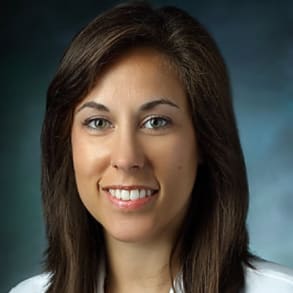Johns Hopkins speech language pathologist (SLP) Rina Abrams recaps a consensus statement by dysphagia experts that was recently published in the journal Otolaryngology–Head and Neck Surgery. The statement focuses on the management of dysphagia in patients with head and neck cancer, to address controversies and suggest opportunities for quality improvement. Care provided by a multidisciplinary team is preferred for optimal care, including evaluations by an SLP and a registered dietitian before, during and after head and neck cancer treatment to guide diet recommendations and prophylactic and therapeutic interventions. Read the full statement here .
Share Fast Facts
Speech language pathologist (SLP) Rina Abrams recaps a statement by dysphagia experts. The statement focuses on the management of dysphagia in patients with head and neck cancer, to address controversies and suggest opportunities for quality improvement. Click to Tweet
I'm Rena Abrams, a speech language pathologist in the Department of OD Laryngology, head and neck surgery at Johns Hopkins Medicine, the American Academy of OD Laryngology, Head and neck surgery Foundation journal published a consensus statement from dysphagia experts around the country in the spring of 2023. Today, I will share key takeaways from this statement which is an excellent summary of the relevant literature available to date. Dysphagia is a common complication with head and neck cancer patients regardless of their oncologic treatment modality or tumor burden. This article summarizes that 28 to 50% of patients report dysphagia with parental cancers at baseline and 45 to 75% long term post treatment, aspiration, pneumonia is reported in 24% of patients have five years post chemo and radiation therapy. Patients also report reduced quality of life due to dysphagia symptoms. Despite this knowledge, there continues to be challenges associated with timing and evidence based swallowing assessments as well as education for patients and caregivers in this population. Therefore, it was determined that an expert consensus statement is indicated. The objective was to develop an expert consensus statement on the management of dysphagia in head and neck cancer patients to address controversies and offer opportunities for quality improvement for providers managing dysphagia as well as to reduce the dysphagia burden to patients. Highlight areas of controversy and identify areas of improvement. After our literature review, these experts achieved 48 consensus statements using a nine point like scale focusing on addressing six specific areas. The first area being risk factors for dysphagia among head and neck cancer patients, they included a variety of things, but some of them included weight loss, performance status, advanced age, advanced tumor stage, just to name a few. The second area was was screening for dysphagia in the head and neck cancer population. They found that screening was best performed at onset of cancer treatment and should include nutritional screening. The third area was evaluation for dysphagia. They were very supportive of instrumental swallowing evaluations including a fiber optic endoscopic evaluation of swallowing and video fluoroscopic swallow study. They agreed that proactive speech language pathology referral is best practice and should include providing prophylactic exercises in the radiation population as well as to encourage maintaining oral intake during their treatment. The fourth area was prevention of dysphagia among these patients and they agree that a multidisciplinary team approach including speech language pathology and registered dietician is indicated as well as managing their pain well and using I M RT as it was found to remarkably approve swallowing function without impacting oncologic results. The fifth area was interventions for dysphagia. Again. They named many things but some of them were diet modification, patient, and caregiver education, oral care, lymphoedema therapy, and a variety of surgical procedures such as dilations and vocal cord injection. Again, they agreed that a multidisciplinary team approach is best. And then the final area that they looked at was surveillance for dysphagia among head and neck cancer patients. They agreed that a lifelong assessment by a multidisciplinary team should be included including individualized monitoring for any signs of dysphagia. It should also include measures of nutritional status, weight and lung function. I encourage you to read the full statements online. Overall involvement and surveillance. With a multidisciplinary team is preferred for optimization of care evaluations by speech language pathology and a registered dietician before during and after head and neck cancer treatment help to guide diet recommendations and prophylactic and therapeutic interventions. Thank you.



